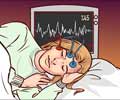Glossary
Circadian rhythm: (circa=about; dies=day) - Approximately 24-hour cycles that are generated endogenously by an organism (eg, sleep-wake cycle)
Ultradian rhythm: Biological rhythms that are shorter than a 24-hour cycle (eg, sleep stages)
Entrainment: Synchronization of the circadian rhythms with environmental cues
Free-running clock: Persistence of circadian rhythms in the absence of environmental cues (eg in patients with impaired ability to entrain or in those without time cues)
Zeitgeber (time giver): Specific environmental variables that provide time cues (eg, light, food-availability cycles)
Sleeplessness (insomnia): Difficulty initiating or maintaining sleep
Circadian rhythm disorders: Malfunction of the circadian timing system or the biological clock
Cortisol: A corticosteroid hormone produced by the adrenal cortex. It is involved in the response to stress; it increases blood pressure, blood sugar levels, may cause infertility in women, and suppresses the immune system.
Serotonin (5-hydroxytryptamine, or 5-HT): is a monoamine neurotransmitter. It is believed to play an important role in the regulation of mood, sleep, emesis (vomiting), sexuality and appetite.












